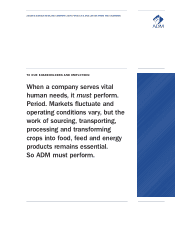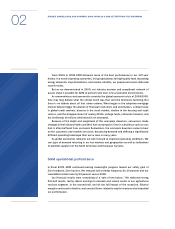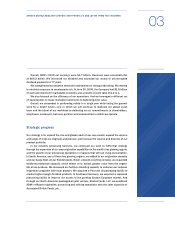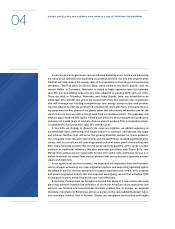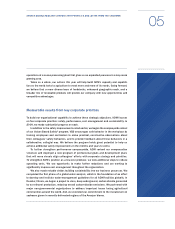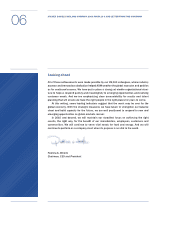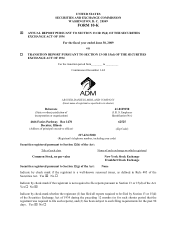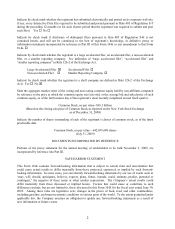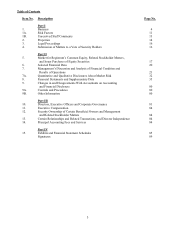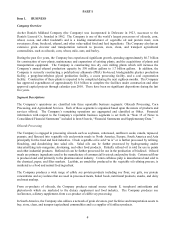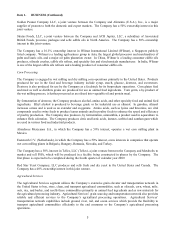Archer Daniels Midland 2009 Annual Report Download - page 10
Download and view the complete annual report
Please find page 10 of the 2009 Archer Daniels Midland annual report below. You can navigate through the pages in the report by either clicking on the pages listed below, or by using the keyword search tool below to find specific information within the annual report.4
PART I
Item 1.
BUSINESS
Company Overview
Archer Daniels Midland Company (the Company) was incorporated in Delaware in 1923, successor to the
Daniels Linseed Co. founded in 1902. The Company is one of the world’s largest processors of oilseeds, corn,
wheat, cocoa, and other feedstuffs and is a leading manufacturer of vegetable oil and protein meal, corn
sweeteners, flour, biodiesel, ethanol, and other value-added food and feed ingredients. The Company also has an
extensive grain elevator and transportation network to procure, store, clean, and transport agricultural
commodities, such as oilseeds, corn, wheat, milo, oats, and barley.
During the past five years, the Company has experienced significant growth, spending approximately $6.7 billion
for construction of new plants, maintenance and expansions of existing plants, and the acquisitions of plants and
transportation equipment. The Company is constructing two dry corn milling plants which will increase the
Company’s annual ethanol production capacity by 550 million gallons to 1.7 billion gallons. In addition, the
Company is currently constructing a polyhydroxy alkanoate (PHA) bio-based, biodegradable plastics production
facility, a propylene/ethylene glycol production facility, a cocoa processing facility, and a coal cogeneration
facility. Construction of these plants is expected to be completed during the next eighteen months. The Company
has approved expenditures of approximately $1.6 billion to complete the facilities under construction and other
approved capital projects through calendar year 2010. There have been no significant dispositions during the last
five years.
Segment Descriptions
The Company’s operations are classified into three reportable business segments: Oilseeds Processing, Corn
Processing, and Agricultural Services. Each of these segments is organized based upon the nature of products and
services offered. The Company’s remaining operations are aggregated and classified as Other. Financial
information with respect to the Company’s reportable business segments is set forth in “Note 15 of Notes to
Consolidated Financial Statements” included in Item 8 herein, “Financial Statements and Supplementary Data.”
Oilseeds Processing
The Company is engaged in processing oilseeds such as soybeans, cottonseed, sunflower seeds, canola, rapeseed,
peanuts, and flaxseed into vegetable oils and protein meals in North America, Europe, South America and Asia
principally for the food and feed industries. Crude vegetable oil is sold “as is” or is further processed by refining,
bleaching, and deodorizing into salad oils. Salad oils can be further processed by hydrogenating and/or
interesterifying into margarine, shortening, and other food products. Partially refined oil is sold for use in paints
and other industrial products. Refined oil can be further processed for use in the production of biodiesel. Oilseed
meals are primary ingredients used in the manufacture of commercial livestock and poultry feeds. Cottonseed flour
is produced and sold primarily to the pharmaceutical industry. Cotton cellulose pulp is manufactured and sold to
the chemical, paper, and filter markets. Lecithin, an emulsifier produced in the vegetable oil refining process, is
marketed as a food and animal feed ingredient.
The Company produces a wide range of edible soy protein products including soy flour, soy grits, soy protein
concentrates and soy isolates that are used in processed meats, baked foods, nutritional products, snacks, and dairy
and meat analogs.
From co-products of oilseeds, the Company produces natural source vitamin E, tocopherol antioxidants and
phytosterols which are marketed to the dietary supplement and food industry. The Company produces soy
isoflavones, a dietary supplement, from a co-product of edible soy processing.
In South America, the Company also utilizes a network of grain elevators, port facilities and transportation assets to
buy, store, clean, and transport agricultural commodities and is a supplier of fertilizer products.

